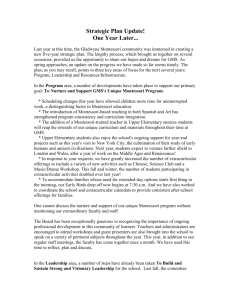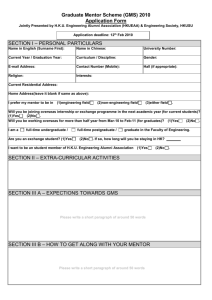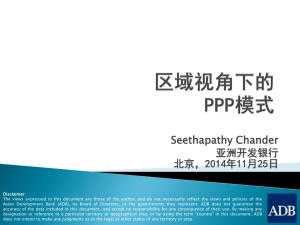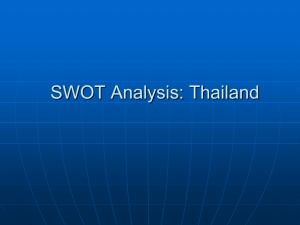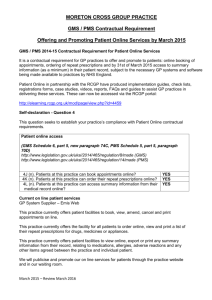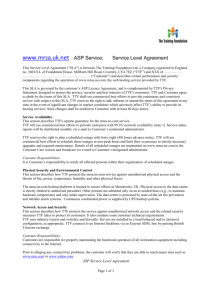POLICY
advertisement
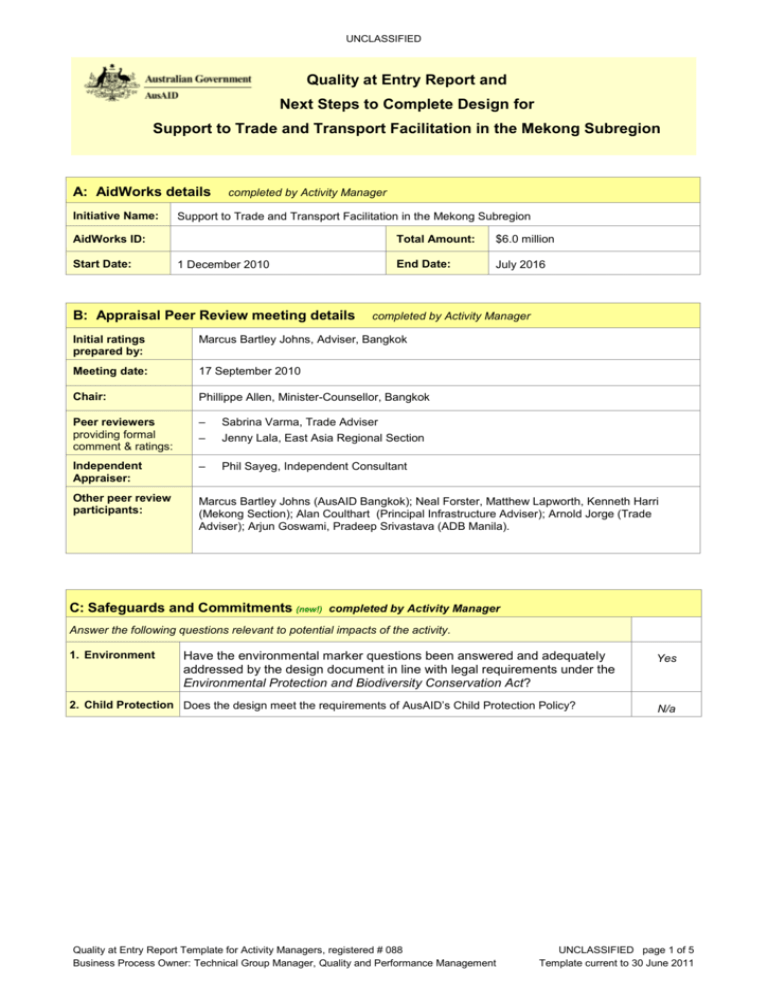
UNCLASSIFIED Quality at Entry Report and Next Steps to Complete Design for Support to Trade and Transport Facilitation in the Mekong Subregion A: AidWorks details Initiative Name: completed by Activity Manager Support to Trade and Transport Facilitation in the Mekong Subregion AidWorks ID: Start Date: 1 December 2010 B: Appraisal Peer Review meeting details Total Amount: $6.0 million End Date: July 2016 completed by Activity Manager Initial ratings prepared by: Marcus Bartley Johns, Adviser, Bangkok Meeting date: 17 September 2010 Chair: Phillippe Allen, Minister-Counsellor, Bangkok Peer reviewers providing formal comment & ratings: – – Sabrina Varma, Trade Adviser Jenny Lala, East Asia Regional Section Independent Appraiser: – Phil Sayeg, Independent Consultant Other peer review participants: Marcus Bartley Johns (AusAID Bangkok); Neal Forster, Matthew Lapworth, Kenneth Harri (Mekong Section); Alan Coulthart (Principal Infrastructure Adviser); Arnold Jorge (Trade Adviser); Arjun Goswami, Pradeep Srivastava (ADB Manila). C: Safeguards and Commitments (new!) completed by Activity Manager Answer the following questions relevant to potential impacts of the activity. 1. Environment Have the environmental marker questions been answered and adequately addressed by the design document in line with legal requirements under the Environmental Protection and Biodiversity Conservation Act? 2. Child Protection Does the design meet the requirements of AusAID’s Child Protection Policy? Quality at Entry Report Template for Activity Managers, registered # 088 Business Process Owner: Technical Group Manager, Quality and Performance Management Yes N/a UNCLASSIFIED page 1 of 5 Template current to 30 June 2011 UNCLASSIFIED D: Initiative/Activity description completed by Activity Manager (no more than 300 words per cell) 3. Description 4. Objectives Summary The Greater Mekong Subregion (GMS) program has helped its members cooperate to achieve dramatic improvements in infrastructure connectivity. Australia has a long history of contributing to GMS infrastructure connectivity through iconic projects, like the My Thuan and Lao-Thai Friendship Bridges. In recent years, GMS governments have increasingly realised that improving physical infrastructure alone is not enough to achieve the significant increases in cross-border trade that they desire. This project will support efforts by Mekong subregion governments to reduce the non-physical barriers to trade by improving trade and transport facilitation (TTF). GMS governments have set out their priorities for progress in TTF in a “Program of Actions”, endorsed by GMS Ministers on 20 August 2010. This Program of Actions was developed based on a thorough process of analysis and consultation, supported by ADB diagnostic work and lessons learned through implementation of the GMS Cross Border Transport Agreement (CBTA). AusAID has provided $2.3 million to support CBTA implementation. The importance of this work has been affirmed by recent AusAID-funded research published by the Centre for International Economics. The proposed new project will be implemented from 2010-2016, and will put into practice the objectives set out in the TTF Program of Actions. Australia will finance the Program of Actions from 2010-11 to 2013-14 including key activities such as: detailed diagnostic work on the key constraints to TFF; capacity building to officials at borders and in line agencies; supporting negotiations and regional meetings on TTF, including to expand traffic rights; and, providing secretariat support to upgraded government bodies responsible for TTF. These activities will be focused in the countries of greatest need: Cambodia, Laos, and Vietnam. The project is fully aligned with AusAID’s Trade and Development policies; the Greater Mekong Subregion Strategy 2007-2011; and ASEAN, APEC, and other regional integration initiatives. The overarching objective for the project is a marked increase in cross-border trade in the GMS along the region’s key land transport corridors. The costs of trade will be reduced through measures like reducing the number of documents required to export goods, streamlining quarantine processes, and improving the capacity of border authorities to implement agreements like the CBTA. The project’s support to exchange of traffic rights negotiations will increase the coverage of the improved GMS TTF regime, allowing vehicles and goods to move directly between the region’s key economic centres. The project will also lead to an improved capacity in Cambodia and Laos for the private sector to take advantage of reduced cross-border trade costs. Although the project is being delivered through the GMS program, its implementation will explicitly reinforce ASEAN’s regional economic integration objectives. The ASEAN Secretariat has been closely consulted in the design of the project to ensure its implementation supports ASEAN objectives. E: Quality Assessment and Rating (no more than 300 words per cell) Criteria 5. Relevance completed by Activity Manager after agreement at the Appraisal Peer Review meeting Assessment Rating Required Action (1-6) * (if needed) The project has strong relevance to AusAID strategic and regional objectives. The project is clearly aligned with the objectives of the AusAID Mekong Subregion Strategy 2007-2011. Objective B2 of the Strategy is to “reduce non-physical barriers to achieve efficient and effective cross-border movement of goods, vehicles and people”. The project is also clearly positioned as linked to relevant ASEAN Economic Community processes. Importantly, the activity is highly relevant to GMS countries’ objectives. GMS Leaders, Ministers and Senior Officials have affirmed the importance of progress in TTF at successive GMS meetings. This has been underlined by the endorsement by GMS Ministers of the detailed GMS TTF Program of Actions in August 2010. Quality at Entry Report Template for Activity Managers, registered # 088 Business Process Owner: Technical Group Manager, Quality and Performance Management 5 n/a UNCLASSIFIED page 2 of 5 Template current to 30 June 2011 UNCLASSIFIED E: Quality Assessment and Rating (no more than 300 words per cell) completed by Activity Manager after agreement at the Appraisal Peer Review meeting 6. Analysis and Learning The project design is based on a large amount of detailed diagnostic and analytical work. A number of diagnostic studies have been completed in recent years, including with Australian funding. Also relevant is the major ADB evaluation of TTF in the Mekong that was completed in late 2008. A Strategy and Work Plan document for TTF was developed in mid 2009, building on these earlier studies and extensive consultations with GMS countries. The slow implementation of the CBTA and the significantly less than expected traffic flows at CBTA pilot border crossings have produced a number of lessons for ADB that have been taken into account in the design of this new project. 5 n/a 7. Effectiveness The objectives of the project are clearly stated. It has been designed to maximise the chance of achieving these objectives, including by building on the significant lessons learned through CBTA implementation, and ADB’s extensive diagnostic work and country consultations. This is strengthened by the high level of political commitment to TTF reform in the GMS and the growing willingness by GMS countries to undertake required institutional reforms. The visibility of Australia’s support for this project – and complementary projects in the Mekong subregional program – will be maximised through agreement that ADB will publicise our support. Direct bilateral engagement with GMS governments and AusAID participation in the annual calendar of GMS meetings will also support this objective. Risks and means of managing them, where possible, have been identified in the ADB Design and the AusAID Design Summary and Implementation Document. Key AusAID risks include: Australia receiving insufficient visibility of its GMS TTF support; a failure to position GMS as a ‘test-bed’ for related ASEAN reform; and AusAID retaining insufficient capacity to manage its involvement in the project following the move of the Mekong Hub to Hanoi in 2011. 4 AusAID (Bangkok and Canberra) to confirm responsibilities for engagement in this project by December 2010, with engagement points in the project outlined in the AusAID Design Summary and Implementation Document. 8. Efficiency This project represents good value for money. Trade facilitation has the potential to deliver an exceptionally high rate of return on the initial investment in terms of increased trade, economic growth and poverty reduction. This has been highlighted by AusAIDfunded research by the Centre for International Economics, published in August 2010. For example, the research found that for each reduction in the average time of trade by one day, GDP in each Mekong country could increase by up to 1.2 per cent. The staff involvement, dollar-for-dollar, will be higher than usual. To ensure the project achieves its objectives, AusAID staff should participate in a minimum of three high-level GMS meetings, as noted in the DSID. Participation in at least one annual review mission would also be advised to support ongoing AusAID M&E. However, the visibility and monitoring benefits of this involvement are considerable. ADB has been chosen as the partner for this project given their lead role on TTF in the GMS, and their history of engagement on TTF issues in the subregion. 4 n/a Quality at Entry Report Template for Activity Managers, registered # 088 Business Process Owner: Technical Group Manager, Quality and Performance Management UNCLASSIFIED page 3 of 5 Template current to 30 June 2011 UNCLASSIFIED E: Quality Assessment and Rating (no more than 300 words per cell) completed by Activity Manager after agreement at the Appraisal Peer Review meeting 9. Monitoring and Evaluation As a technical assistance project focused on policy dialogue and reform, effective monitoring and evaluation will be essential in demonstrating that the project has achieved tangible results. For example, well-conducted surveys of cross-border traffic at selected crossings, or measurement of the time taken to travel between selected city pairs, will be needed to demonstrate whether the activity has had an impact. Demonstrating results in some areas of the project will be easier than others. For example, supporting negotiations on exchanges of traffic rights should result in an expansion of the territory vehicles are able to travel to under CBTA, opening up new city pairs for cross-border trade. The peer review and consultations with ADB confirmed the need for a dedicated M&E specialist, particularly to define subproject 1 indicators at the start of project implementation, and to evaluate results in the closing stages of subproject 1. 4 ADB to develop detailed M&E indicators for subproject 1, with assistance from M&E consultant at start of implementation ADB to consider whether overall indicators for Design and Monitoring Framework need to be revised, e.g. trade volume targets may need be revised upwards 10. Sustainability The project’s sustainability depends on the extent to which high level commitments for reform translate into institutional will in each GMS country to make significant progress on the TTF agenda. Another key consideration is the extent to which ASEAN TTF initiatives create pressure on GMS TTF reform. At present, GMS initiatives are far more advanced, and this project has been designed explicitly to provide a ‘test-bed’ for ASEAN reform on initiatives like the ASEAN Single Window. ADB’s environmental assessment and safeguards policies apply to this project, and have been discussed with the AusAID Environment Adviser. No separate environmental assessment for this activity by AusAID is required. 4 Continued monitoring by ADB and AusAID will be required to ensure that the high level of will and institutional changes on GMS TTF translate into sustained reform. Regional developments in TTF, particularly on the ASEAN level, will also need to be monitored, as they may create additional pressure on TTF implementing agencies in the 5 ASEAN GMS countries. 11. Gender Equality ADB will undertake a comprehensive, 12-month technical assistance project to assess potential gender and social impacts (not HIV as this is addressed by existing AusAID-ADB project) of improved TTF in the GMS, and devise strategies to address these impacts. The gender work, while separately financed through Australia’s $1 million contribution to the ADB Gender and Infrastructure Multi-Donor Trust Fund, will be closely linked with the work undertaken through this TTF project. The ADB teams responsible for leading each project will coordinate closely. The AusAID Gender Unit has been closely involved in the proposal to address gender in the TTF project in this manner, and has supported the approach. 5 AusAID to continue close engagement with ADB on possible gender and social impacts of increased TTF in the GMS * Definitions of the Rating Scale: Satisfactory (4, 5 and 6) Less than satisfactory (1, 2 and 3) 6 Very high quality; needs ongoing management & monitoring only 3 Less than adequate quality; needs to be improved in core areas 5 Good quality; needs minor work to improve in some areas 2 Poor quality; needs major work to improve 4 Adequate quality; needs some work to improve 1 Very poor quality; needs major overhaul Quality at Entry Report Template for Activity Managers, registered # 088 Business Process Owner: Technical Group Manager, Quality and Performance Management UNCLASSIFIED page 4 of 5 Template current to 30 June 2011 UNCLASSIFIED Quality at Entry Report Template for Activity Managers, registered # 088 Business Process Owner: Technical Group Manager, Quality and Performance Management UNCLASSIFIED page 5 of 5 Template current to 30 June 2011

